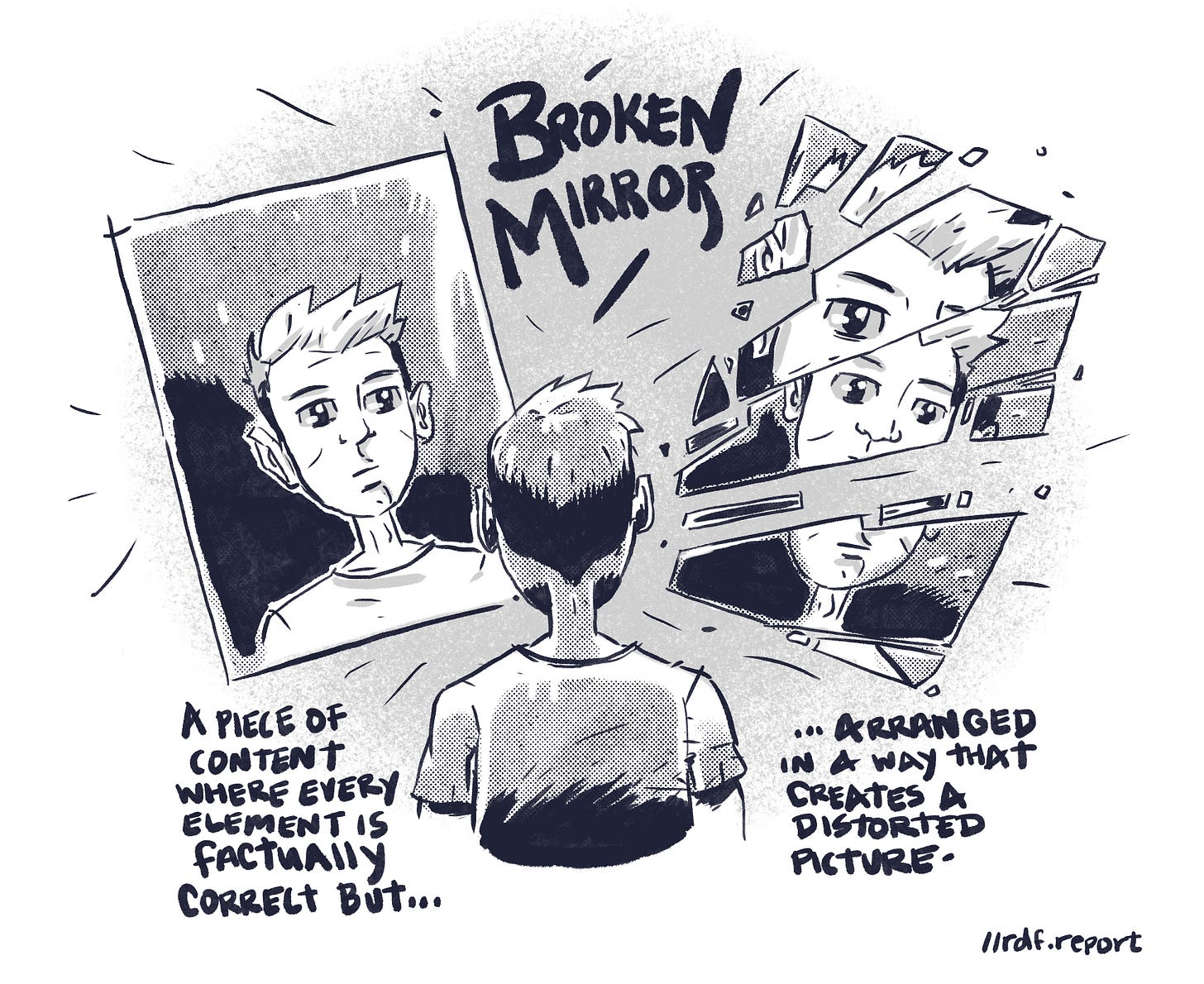🐝 Information Collapse; Broken Mirror; The Wire° #4
You got soft eyes, you can see the whole thing.
A newsletter about seeing clearly in an age of reality distortion — e.g. computational propaganda, perception control, superhuman manipulation, self-delusion, and information collapse.
Lovely to see you again.
In this issue:
Information Collapse & The 29th Day
Definitions: Broken Mirror
Ministry of Hyperlinks
Darkwired
Bunk Moreland (The Wire) on seeing clearly


VIDEO/MUSIC/BOX | National Museum of African American History and Culture

INFORMATION COLLAPSE & THE 29th DAY
Information Collapse: A drastic decline in the health of our information ecosystem, resulting in system failure.

Might we be on the eve of Information Collapse?
When collapse approaches, whether for a sandpile or ecosystem, everything kind of looks ok… until it’s not.
Biologist Edward O. Wilson used the following riddle to describe how the eve of an ecological collapse must feel:
At first there is only one lily pad in the pond, but the next day it doubles, and thereafter each of its descendants doubles. The pond completely fills up with lily pads in 30 days. When is the pond exactly half full?
Answer: The 29th day.
On the 29th day, the pond is half-choked to death, but it seems OK. Surely we have another 29 days to fix the problem?”
We have more information — more good information — available than at any other time in human history.
And yet...
We live in an age where two reasonable people can’t agree on a basic set of facts.
You know this all too well if you’ve ever gotten in an argument over vaccinations, immigration, or whether the coronavirus is just a flu.
Was it always this way, or is the reality distortion getting dialed up to 11?
Without vigilance, without constant course-correction, entropy takes over, and online communities decay — hard.
However unlike a Slack workspace or Twitch, our newly-minted massive, global online community has no all-powerful owner to kick out the trolls and the state actors waging information war. Who’s to stop entropy from kicking in?
Four worrisome trends that may portend collapse, per the RAND report, Truth Decay:
increasing disagreement about facts and analytical interpretations of facts and data
a blurring of opinion and fact
the increasing volume and influence of opinion and anecdote over fact and analysis
declining trust in formerly respected sources of factual information
Are these trends accelerating? We don’t have enough empirical evidence to know for sure. As political scientist Henry Farrell says, our modern, technologically-fueled information ecosphere is remaking markets and politics from the ground up.
“We don’t know nearly as much as we ought to about the workings of these [new] processes of information gathering, of information analysis, of information use,” he concludes.
If this is our 29th day, what happens on the 30th?
One doesn’t have to stretch too hard to imagine how bad the reality distortion can get. Pick your crisis of the past several years — a war, recession, the rise of authoritarianism, a genocide, pandemic response... riding alongside each is information corruption, and our collective failure to see clearly.
When we look through a glass darkly, institutions fail and societies fall.
Surely we still have another 29 days to fix the problem?
[Note: the phrase “Information Collapse” came to me via word-of-mouth, and I’m unable to identify and credit the source]

DEFINITIONS: BROKEN MIRROR


MINISTRY OF HYPERLINKS
😈The seven types of people who start and spread viral misinformation. Spoiler alert: you’re related to one. (BBC)
📚Socially-distant summer beach reading: The Best Books on the Politics of Information, including a novel and a silicon valley memoir , accompanied by a wonderful interview with the list creator, political scientist Henry Farrell. (Five Books)
👺The hucksters behind the Chloroquine “scientific paper” a.k.a Google Doc. Spoiler alert: not really a doctor. (DailyMail)
🇺🇸2020 World Press Freedom Index. The USA is not #1. Or #2. Or #44. (Reporters Without Borders)
🤔For philosophy-lovers: Why do you believe what you do? Run some diagnostics on it. “Learning how susceptible my beliefs are to these sorts of influences makes me a bit squirmy.” (Aeon)
🦄The illusion of causality is linked to the belief in pseudoscience. “Just as there are optical illusions, there are also causal illusions that may be responsible for developing beliefs without proven foundations.” (PsyPost)
🎉 Dystopedia. Who knew that changing Wikipedia articles to the past tense could be so much fun? Albeit in a post-apocalyptic kind of way. (The Commonplace).
🇷🇺How (Not) To Report On Russian Disinformation. “The New York Times’ treatment of [the site] The Russophile is a concise case study in exactly what not to do in covering disinformation.” (bellingcat)
🃏The relationship between populist leaders and disinformation:

(Michael Hameleers, University of Amsterdam)

D A R K W I R E D
The year is 2028.
The #2 app for Apple AR Glasses, Rose Color, personalizes the message on every billboard in your field of view.
Vegan? You’ll never see another McDonalds ad.
Not Vegan? That PETA billboard now shouts “Got Milk?”
Don’t care for MAGA hats? Lo, it’s a Yankees hat!
Black Lives Matter lawn sign? Now reads Blue Lives Matter. Or vice versa.
Users of Rose Color report far greater certainty in their political opinions than those who don’t.

DISTORTION-FREE ZONE

Thank you for being here.
Please forward this issue to your favorite Russian bot. And hit the ♡ button.
With gratitude,
— Upendra
Be kind whenever possible. It is always possible. — H.H. the Dalai Lama XIV
P.S. Got this from a friend? Subscribe and get your own:

